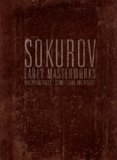| Reviews & Columns |
|
Reviews DVD TV on DVD Blu-ray 4K UHD International DVDs In Theaters Reviews by Studio Video Games Features Collector Series DVDs Easter Egg Database Interviews DVD Talk Radio Feature Articles Columns Anime Talk DVD Savant Horror DVDs The M.O.D. Squad Art House HD Talk Silent DVD
|
DVD Talk Forum |
|
|
| Resources |
|
DVD Price Search Customer Service #'s RCE Info Links |
|
Columns
|
|
|
Sokurov: Early Masterworks
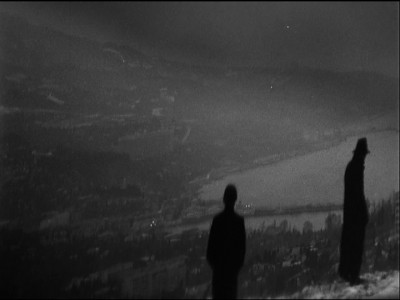
The Russian filmmaker Aleksandr Sokurov, probably most famous for the astonishing technical/aesthetic single-take feat of his 2002 film Russian Ark, first came to this reviewer's attention courtesy of the accolades that critics, cultural commentators, and cinephiles such as Paul Schrader and Susan Sontag heaped upon his 1997 masterpiece, Mother and Son, which still stands as one of my personal most transformative cinematic experiences (if you haven't yet seen it, grab any chance that arises to do so; you'll never be the same). Sokurov's films are defiant, unqualified "art films" to the core; he is the clearest heir to his Russian cinematic forebear, the towering Andrei Tarkovsky (The Sacrifice), and his work can be seen as its own version of Tarkovsky's deeply contemplative, even "religious" modus operandi. Sokurov, too, creates wonderfully distinctive, irreducible/uninterpretable imagery; he, too, insists upon the glacial pacing that slows down and conquers time as the films lure you in and draw you along with their superlative, completely original beauty (you really never have seen movies that look or sound quite like these; the closest would, again, be Tarkovsky, with a strong nod to Bresson in the films' rigorously controlled audio environments). The best Sokurov films impart a wordless, purely sensory aura of deep, hypnotic mystery, leaving you with that dazed but open-eyed, transcendently altered, converted sense brought about only by the most noble, ambitious, accomplished art in any medium. Now, the ever-astute American film distributor Cinema Guild has released three of Sokurov's earlier films -- 1990's Save and Protect and 1992's Kamen (Stone) on DVD, along with 1994's Whispering Pages on Blu-ray -- to further expand and enhance our exposure and understanding of one of the world's most important living filmmakers. Sokurov: Early Masterworks is a triptych of unburied treasures, each more extraordinary and inspiring than the last, that should stand as a landmark home-video release and a cause for celebration among all North American cinephiles (DVD "Region 1" being at least one territory where these films have rarely been seen and have long been unavailable) worth their salt.
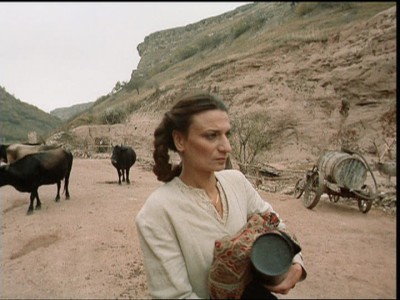
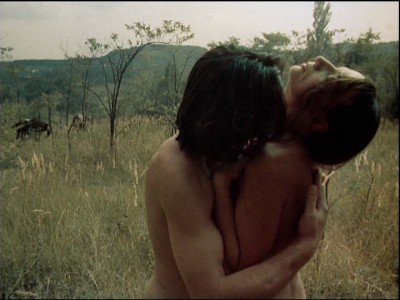
Cécile Zervudacki, Sokurov's Mme. Bovary, channels the small-time doctor's wife's yearning for something better, richer, more sublime, more cultured, and more passionate in a way that's half-operatic, half-possessed: Her nonstop physical frenzy as Mme. Bovary's consuming, always thwarted and compromising desires lead to her downfall, destitution, and death in the world outside the bedroom is scintillatingly powerful, as are her and costar Aleksandr Cherednik's emotionally and literally naked boldness in the film's many lushly, graphically erotic scenes of sexual consummation, which bear witness to the idea that there is a place other than neurosis and impending breakdown wherein this desirous woman's physicality is natural, gratifying, and fully expressed (though that place is forbidden, the gratification punishable by exclusion from respectability and the ordinary, passive life of her serene village). Speaking of the village, its cliff-dwarfed group of buildings around a dirt road, and most of the other environs through which we follow Mme. Bovary's sensuous journey to the grave, few filmmakers are as sensitive to the visually significative possibilities of nature as Sokurov (perhaps Terrence Malick, though without the infinitesimal savoring and transfixed concentration of his Russian colleague), and the fact that it's 19th-century Russian rural architecture and agricultural ways of life through which Mme. Bovary's story is being retold, and that it's spacious, near-monumental Siberian steppes that form the majestic background for her travails, makes the film feel like a singularly Russian experience -- deeply felt, metaphysical and poetic while at the same time earthily palpable, and pregnant with an unfettered aura of sheer gravity, all attributes that stretch from Dostoyevsky to Chekhov to Tarkovsky through to Sokurov -- despite the material's decidedly French origins. Employing the considerable talents of cinematographer Sergei Yurizditsky, Sokurov creates truly painterly images, whether of closed-in, evocatively overstuffed interiors or the wider, more open landscape shots -- fixed, concocted, flattened, often forced/warped-perspective framings and compositions that anticipate the original visual sensibility Sokurov would continue to advance through the other two films included in Early Masterworks, finally bringing it to full perfection in his greatest film, Mother and Son.
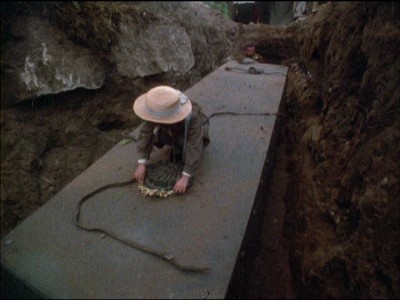
Perhaps by necessity given its well-known and predetermined Madame Bovary narrative, Save and Protect is more novel-like, less strictly poetic -- i.e., more burdened down with plot, with a lighter density of brilliant, ineffable, exclusively-cinematic moments -- than the other films in Early Masterworks, but it remains the least conventional take on Madame Bovary one is ever likely to come across at the movies. The classic novel, stylistically provocative and radical for its time, has been remade by the equally radical Sokurov in his own inimitable image for his own time, resulting in a rebirth through re-mystification of a familiar, though venerable, literary work as a film that is irresistible, haunting, and strange in the best possible way.
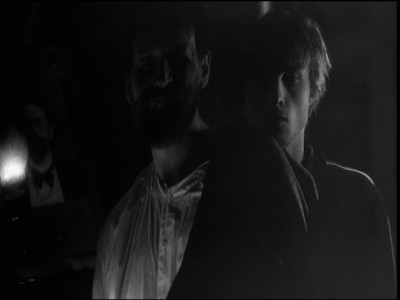
The later two films in the set break almost entirely free of narrative to give us impressive, fully-flowered examples of Sokurov's bold stylistic techniques and the resulting petrifying, vertiginous beauty to which they lead -- his rare brand of cinema that is so much more mysterious, so much more like poetry or music (with a strong core of deeply felt, heavy-weighing, wordless cultural and historical awareness) than what movies are usually allowed to be. Stone, from 1992, was filmed at one of the former Soviet Union's tourist attractions, late-19th-century literary giant (and Uncle Vanya playwright) Anton Chekhov's "white dacha," a well-appointed, self-designed villa/retreat in the southern-Ukrainian province of Yalta, where, because of his tubercular illness, he reluctantly moved near the end of his life to escape the cold of Russia's bigger, more urbane and cultivated metropolises. But Stone, with its deeply elliptical, enigmatic images/editing and overall ghostly black-and-white pallor, is no postcard mailed off on behalf of the Yalta tourism board. To begin with, it's purposely obscure and demanding at every aesthetic and narrative level, calling upon us to give in completely to its foggy, distorted, half-dreamed nighttime spell well before we ever have any clue who its two male characters are or what's going on. All we see at first is the (barely) moonlit discovery of what appears to be a distinguished, anachronistically dressed gentleman -- a nighttime intruder -- in a 19th-century villa by a younger man who seems to be guarding the place. What we very gradually learn (if we pay minutely close attention; it's all extremely subtle, very unpredictable, and related with highly idiosyncratic emphases) is that the younger man actually is the watchman for this half-abandoned, run-down (because of post-Soviet shrinkage in public funds and hyper-capitalistic Putin-era philistinism, with less and less time or thought for art and culture) site of tremendous cultural-historical-literary importance, and his intruder/interlocutor is the ghost of the great Chekhov, one of Russia's multiple immortal gifts to world literature and creator of a proud, exclusive legacy that, as inferred through melancholy clues dropped in this unusual pair's sometimes gnomic conversations, have been shamefully shoved aside in the non-Western world's race to join in with the fun-looking disposability of high-speed, up-to-the-minute culture.
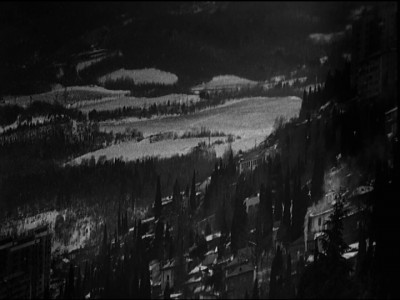
Stone is virtually plotless; its journey is a metaphysical one, fading back through the blurred lines of time. Its few events are, in their entirety: The young man's meeting of this ghost; the dawning of awareness of their situation; their opaquely significance-laden, silence-riven verbal interactions; and their funereal stroll to survey the desolate village and its surroundings, followed by the ghost's casual beckoning to the young man to go "with him" (into, presumably, an afterlife where pasts and presents intermingle on a wiser and more equal footing), and the young man's acquiescence, all played out through tableaux of starkly de-familiarized, dimly-lit interior space, strange silhouettes, and sudden cuts to vastly wide, near-abstract topographical shots. The images that Sokurov and his frequent cinematographer Aleksandr Burov create are mediated by some kind of lightly speckled additional filter placed between the lens and the mise-en-scène, which gives every frame the precise grain and texture of a very old black-and-white photograph, while the lenses themselves have been chosen and employed to distort, elongate, and flatten in a way that renders any given visual in the film decisively anti-realistic and very uniquely, genuinely, and rapturously "painterly" (of all the Early Masterworks, this is the one whose focus, pacing, and quality of imagery most closely resemble those of Mother and Son).
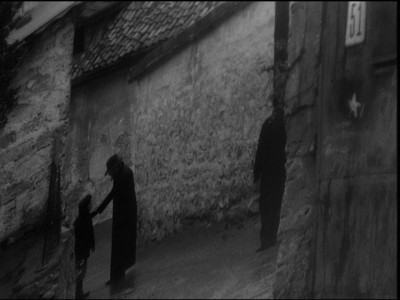
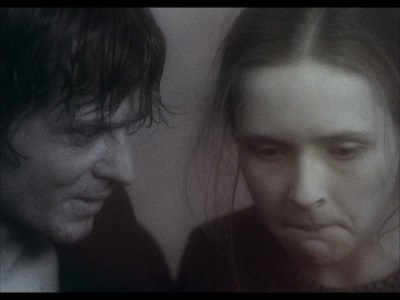
Though it is, like Save and Protect, a sort of "adaptation," Sokurov's 1994 masterpiece is a huge advancement from Save and Protect's reliance upon its more or less recognizable Flaubert lifeline, and the film is even a progression some way further from the advanced, daring accomplishment of Stone. Its 80 or so minutes are more an extended, dream-like riff on Dostoyevsky's Crime and Punishment than any sort of actual retelling (the credits say "inspired by 19th-century Russian literature," and it's a safe bet that aficionados of those great books will have a field day spotting any other fragments that Sokurov might have tenderly enfolded into his beguiling cinematic hallucination). Scraps of the plot of Dostoyevsky's famous, St. Petersburg-set 19th-century novel thread their way in and out of what are displayed here as that city's timeless, placeless backstreets, through which we see a man (Aleksandr Cherednik, the crushingly handsome seducer from Save and Protect), presumably some iteration of Crime and Punishment's guilt-ridden pre-existentialist Raskolnikov, heavy-heartedly ambling, with intermittent, recognizable interludes from Dostoyevsky's plot punctuating what appears to be...well, it's difficult to say for certain just where this "Raskolnikov's" tortured meanderings take him. The film's first shot appears to be of a very contemporary St. Petersburg, and the subsequent slipping in and out of scenarios and events (and, likely, times) suggest that Raskolnikov, the supercilious inspector who means to trap him, and the young woman who would be his salvation (in the novel, she is; Sokurov's Raskolnikov, however, leaves things on a much more ambiguous, if not nihilistic, note) become, like "Chekhov" in Stone, apparitional presences, shape-shifting composites from an illustrious Russian tradition of metaphysics, philosophy, intellectualism, poetry, novels, and art who are now anachronistic spectres haunting a desolate, at times apocalyptic present they can scarcely discern or, when they do see it, find wrenching, hellish; you'll never forget a lengthy scene in which a fog emerges after a downpour to create a frightening, abstractly desolate end-of-the-world image (seen, perhaps, from this "Raskolnikov"'s subjective vision) accompanied by overwhelming layers of sound simultaneously pulling in diegetic crowd and storm noises and a gloriously evocative excerpt from Mahler.
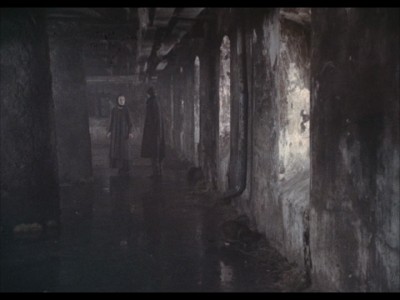
Attempting to pin down, "interpret" Whispering Pages would be both a stab in the dark and, in the end, a disservice to the film -- the same reason why one needn't even be all that familiar with Dostoyevsky's novel or 19th-century Russian literature to "get it" (to the extent that it can be "gotten" -- meeting this film on its terms is more like opening yourself to the peculiar feeling of a particular combination of perfectly arranged musical notes). It's a sensuous, one might even say spiritual experience; the film stretches that cultural-conservative/aesthetic-radical paradox laid out so bracingly in Stone to its limit, so that Whispering Pages becomes not a storytelling device but a repository and conduit through which pure, wordless sense-memory and feeling flows directly from Sokurov's most intimate impressions of the great art he's taken in and held dear; it's a film so single-minded, seemingly self-generating, and uncategorizable, it could just as plausibly be an artifact from very near the beginning of the cinema (certain black-and-white scenes carry a heavy overtone of silent-film aesthetics, especially Expressionism) or the last film ever made, from some unknown point far into the future. Sokurov is not rotely transposing the stories told in that great, long-ago literature for which he feels such a deep affinity; he seems to have set himself the much more difficult challenge of conveying the endlessly inquisitive, soul-searching, agonizing essence of those morally and psychologically penetrating works, in a way that no words, but only a very particular manner of composing and combining images and sound, could ever do. He pulls it off, an accomplishment that makes the film a sort of miracle that has to be seen to be believed. I'm doing my level best, here, to at least convey the overwhelming impression the film makes and some of the methods by which it attains its head-spinning effect, but Whispering Pages is tangible, immediate, and viscerally profound in a way that makes it well-nigh indescribable.
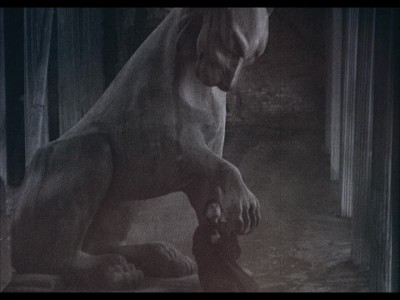
Whispering Pages, the most recent work including in this fantastic compilation, is number 1 in the box set's 1-2-3 ordering, but I watched it last, and in the final analysis, reverse-chronological is the viewing order I would recommend, since Whispering Pages works even better as a culmination of the rich possibilities ribboned through Save and Protect and fully maturing in Stone, a peak in both Sokurov's work and in world cinema -- a unique film that realizes its uncannily, wholly original vision to such an extent that it leaves you feeling marked by it, with your perceptions permanently altered and expanded. In this way, Sokurov: Early Masterworks consists of what amount to three leaps, each more risky and successful than the last, toward some sublime cinematic Holy Grail relentlessly pursued by Sokurov; each of the films further refines and perfects this one-of-a-kind master's seemingly impossible but unequivocally noble mission to hone his medium down to its purest essence, to a state of sacred visual and aural mystery that can only be believed by laying your own eyes upon it and experiencing it for yourself.
THE BLU-RAY DISC AND DVD'S:
Each disc contains an "about the transfer" menu option informing the viewer of the sorry state in which all three of these films were left, and of the fact that the greatest effort was expended to bring the best materials available up to some kind of par, though like-new recovery was impossible. The biggest stroke of luck in the process of putting Sokurov's early works together for this release was the discovery of a less-scathed German print of Whispering Pages that was deemed suitable for high-definition transfer (hence that film's presence on Blu-ray, but only DVD editions of the others; and it is the best-restored of the set). There are signs of years of neglect and battery (occasional lines, intermittent badly-scratched sequences, and consistent instances of more minor scratches and wear) throughout, but these badly damaged films have been salvaged to a sufficient degree that the flaws don't ultimately compromise their aesthetic qualities or render them in any way unwatchable. Cinema Guild has, with their usual discernment, insisted on retaining the films' cinematic texture, so even though they're hardly pristine-looking, these glorious visual experiences have been allowed to keep looking like movies, which is something to be acknowledged gratefully; there's a gratifyingly very sparing use of digital noise reduction and few instances of the usually accompanying edge enhancement from draconian cleanup processes. The aspect ratio for Save and Protect is 1.33:1; the same for Stone; and Whispering Pages is presented at an aspect ratio of 1.40:1.
Sound:Each film is presented with a Russian Dolby Digital 2.0 soundtrack (with optional English subtitles), and, the sound being a more foundational element for Sokurov than for the majority of filmmakers, it's a good thing that the sonic dimension has in some cases fared better than the surviving images: These are all films with technologically modest, mono soundtracks, but the layering of voices, music, and the noises of the environment have been very carefully and intentionally designed and are as important as the images to the ways the films feel, and most of the sound has been kept sufficiently intact to retain its intended power. There is a degree of crackle and hiss unusual for DVD/Blu-ray releases of any film, even older films, but this seems to have been an unusually difficult rescue mission from materials that have survived some extreme neglect, so in context, the fact that the sound is even and audible (distortion is only light when present, and the mixes seems to have fully made the transition) is something of an extraordinary feat, however imperfect it is.
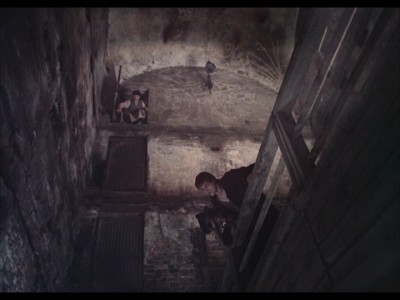
Disc 1 (Whispering Pages) also contains two documentaries by Sokurov on internationally prominent Soviet/post-Soviet political figure (and President) Boris Yeltsin: 1989's Soviet Elegy (37 min.), in which Sokurov intercuts present-day footage of Yeltsin with bounteous archival material to create a portrait of a man carrying a complex personal history, and an infinitely heavier political/cultural history, on his shoulders; and 1991's An Example of Intonation (50 min.), a more straightforwardly styled documentary (featuring Sokurov himself in conversation with Yeltsin, joining the Yeltsins around their dinner table, etc.) that finds Yeltsin in his honeymoon period as the leader of a newly post-communist Russian Federation. There's also a documentary on Sokurov, 2008's Questions About Cinema (60 min.), which was made for French TV, and in which Sokurov, interviewed in St. Petersburg, proves himself a humble but exacting aesthetic philosopher, discussing the very elements of cinema in an incisive way, whether in general terms or using examples from his own oeuvre (illustrated as appropriate by the relevant clips from his films). Disc 1also features a trailer for another Cinema Guild Sokurov release, 2008's Alexandra, as well as a handful of previews for other worthy Cinema Guild titles.
Supplements on disc 2 (Stone) include an audio commentary by film critic/curator James Quandt, whose confession that it's the challenge of trying to "interpret" or otherwise figure out the surpassingly beautiful, purposely opaque Stone -- along with equal measures of thoughtfulness, erudition, and unabashed joy and pleasure-taking in -- make his comments enlightening and helpful without intimidation. There's also "The House that Chekhov Built,", a half-hour BBC radio documentary first broadcast in 2010 (and played here over the first 30 minutes of the film) on Chekhov's "white dacha" residence that features prominently in Stone and its post-Soviet loss of funding as a museum; St. Petersburg: Kozintsev's Flat (1998, 48 min.), part of Sokurov's series of TV documentaries on the former Leningrad, in which the director's (video) camera does, in a more straightforward-documentary but still admiring, visually acute way, for the St. Petersburg flat of the late Soviet filmmaker Sergei Kozintsev, renowned for his movie adaptations of Cervantes and Shakespeare. Finally, there's Sonata for Hitler, Sokurov's 10-minute 1979 film (banned and never publicly shown until 1989) that collages archival footage of the Nazi leader, pre- and mid-WWII Germany, and various Nazi atrocities via a montage that creates dissonant visual juxtapositions laid over with a clashing soundtrack derived from the dissimilar Bach and Penderecki to create a most unsettling fever-dream-of-history effect.
Cinema Guild has also taken into consideration those who haven't yet made the transition to Blu-ray by including, on disc 3 (Save and Protect), a standard-definition version of Whispering Pages that can be played in your DVD player.
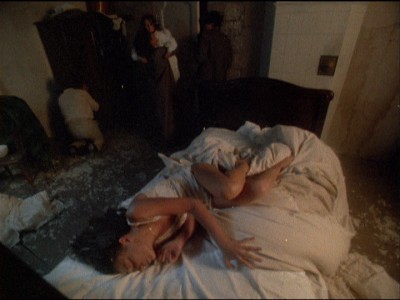
FINAL THOUGHTS:
Aleksandr Sokurov's films, of which each of the three examples in Sokurov: Early Masterworks is a further perfected, more exquisite example than the last, are unapologetically dense, difficult, complex works that have no qualms about aiming for the most unfathomable, transcendent effects of the greatest, most timeless works of art. Sokurov is an artist of celluloid who wholly embraces the cinema as his medium: He's an old-fashioned, perfectionistic, idealistic purist looking for profundity through the stretching of his medium to its furthest, most uniquely fruitful limits, so the fact that each of the films in Early Masterworks engages directly with great classical literature and music (the rare arrival of a transporting classical selection is the only non-diegetic sound in any of these films; Save and Protect (1990) is adapted from Flaubert's Madame Bovary; Stone (1992) and Whispering Pages (1994) revisit the legacies of, respectively, Chekhov and Dostoyevsky) means less and less as you wend your way through Sokurov's dreamlike, exquisitely sensitive, unpredictably shifting, unfailingly and singularly gorgeous visual and aural scenarios. It's misleading to consider these films, especially the later two, as any kind of "adaptation," when they're more like miraculous crystallizations of the same emotional and aesthetic essence captured by Chekhov or Dostoyevsky, but ones that would only ever be possible in the cinema, and in the cinema alone. If Save and Protect is a relatively "straight" adaptation of Bovary that incorporates large swathes of recognizable plot, its frequent flights into ineffable, inexplicable passages of sheer, strange cinematic invention hint at the pure movie poetry Sokurov will spin out of Anton Chekhov's legacy in Stone (in which the eminent Russian author is a ghost luring a contemporary young Russian man in mourning for Russia's bygone cultural glory into a deathly realm where great, immortal artistic accomplishment is still given credence) and from Dostoyevsky's Crime and Punishment (along with multiple other relevant elements incorporated from Russia's long-venerated 19th-century literature) in Whispering Pages, an extended riff that plays out as a troubled dream one might have after drifting restlessly to sleep while deeply submerged in one of Dostoyevsky's philosophical/psychological/metaphysical juggernauts.
The greatness of Sokurov's work derives from his ability to transform the celluloid frame into a dreamscape that combines elements from life, art, history, and drama in an evocative, enigmatic, indelible way never really tried before or since. As with one's own most disturbing, unforgettable but ungraspable dreams, you can describe them all you want, but never to anywhere near the original effect; fortunately, unlike our own nighttime subconscious forays, these "dreams" (or meditations, or fantasies -- all apt characterizations) have been permanently imprinted on film by Sokurov's minutely sensitive, conscientious hand, and they can thus be experienced and re-experienced directly, now with more ease than ever thanks to their very welcome compilation in Early Masterworks. Needless to say, these films have zero use or time for plot, character development, and they're not for any moment where you're more in the mood for diversion, entertainment, or escapism. They're what I, through some vestigial religious impulse, metaphorically consider "Sunday morning films"; whatever your preferred terminology for the sacred, spiritual, or transcendent is, that's the kind of experience these films constitute, weighty and life-changing, not something to wind down with after a hard day at work, and impossible to ever dismiss with that (always-wrongheaded) trivializing phrase "just a movie." Sokurov is a member in excellent standing of that extremely rare group of filmmakers that also includes Robert Bresson (The Devil, Probably), Béla Tarr (The Turin Horse), and Sokurov's own mentor, idol, and fellow world-class Russian filmmaker Andrei Tarkovsky (Solaris) -- artists who've chosen film, seemingly independent of any cinematic influence, as simply the most powerful medium for their deep, fraught, expansive personal visions. Like those predecessors in moving-picture alchemy, Sokurov does amazing things with the medium, with a tremendous and apparently effortless skill, that nobody else would ever think to do, to bring forth works that simultaneously invent and break their molds -- visionary films that are, it's no exaggeration to say, utterly unlike any others. Highly Recommended.
|
| Popular Reviews |
| Sponsored Links |
|
|
| Sponsored Links |
|
|
| Release List | Reviews | Shop | Newsletter | Forum | DVD Giveaways | Blu-Ray | Advertise |
|
Copyright 2024 DVDTalk.com All Rights Reserved. Legal Info, Privacy Policy, Terms of Use,
Manage Preferences,
Your Privacy Choices | |||||||









